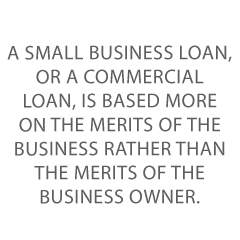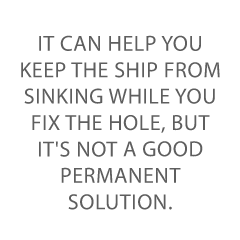Is a business loan a good idea?
It depends on what type of terms and rates you qualify for and what you need the funds for. For example, if you are looking to shore up a cash flow leak, it may be a good idea to buy you time.
It can help you keep the ship from sinking while you fix the hole, but it’s not a good permanent solution.
However, if you are in a position to grow and expand, and in the long term the loan funds will make you more profitable, a business term loan can be a very good idea.
You just have to be certain you can handle the repayment.
How hard is it to get a business loan?
It depends, again, on the type of loan and the lender you use. Generally speaking, it can be hard to get a business loan.
A lot of the approval process is based on the ability of the business to repay the loan, rather than the owner. So if your business is doing well, that makes it easier.
However, your personal credit is still considered in the approval process. So, if you have bad credit, or your business isn’t profitable, it can be quite difficult to get this type of business financing.
How much collateral is needed for a business loan?
A secured loan is definitely an option if you have collateral. How much collateral is necessary for secured business financing approval depends on a number of factors. Typically the security is the business, or in the case of equipment financing, the equipment being financed. The SBA loans have their own requirements. For example, the 7(a) loan program collateral requirements are as follows according to sba.gov. “Lenders are not required to take collateral for loans up to $25,000. For loans in excess of $350,000, the SBA requires that the lender collateralize the loan to the maximum extent possible up to the loan amount. If business fixed assets do not “fully secure” the loan the lender may include trading assets (using 10% of current book value for the calculation), and must take available equity in the personal real estate (residential and investment) of the principals as collateral.” 👉 As you can guess, this is only a handful of business lending options that can help you get the financing you need for a company loan. If you would like to explore more funding options, schedule a free business financing assessment today! Whatever you choose, contact us today to explore your options, including how to get business credit cards or a business line of credit, build business credit, and make your business more Fundable™ to lenders.
Simply put, a small business loan is a loan you get to fund your business. There are some misconceptions out there, however. For example, you can technically get a personal loan to fund your business. That would not technically be a business loan.
There are several different types of small business loans. You can get a secured or unsecured loan.
You can also choose between a term loan and a line of credit. There are many different types of each one available as well.
Understanding what each one is and how it works is important when it comes to choosing the one that will work best for your needs.
What is a Business Loan?
 A small business loan, or a commercial loan, is based more on the merits of the business rather than the merits of the business owner.
A small business loan, or a commercial loan, is based more on the merits of the business rather than the merits of the business owner.
As a result, they often have higher limits and better terms than personal loans. However, that leads to another misconception.
Just because a business loan is in the name of the business and based on the merits of the business, does not mean that it will not affect your personal credit or that your personal credit will not be a consideration.
It all depends on the type of business loan you get. Sometimes personal credit is affected, and sometimes it isn’t. Sometimes you have to have good personal credit to get a business loan, sometimes you do not.
How Do Business Loans Work?
Again, it all depends on the type of small business loan that you get. A traditional term loan works just like a personal loan. You fill out an application with a lender, turn in all the necessary documents, and wait.
If approved, you will receive your funds and can use them as needed or as agreed upon in the loan terms. Then, you will repay the loan according to the terms.
With a traditional loan, this means you pay a set amount each month for a set amount of time until the loan and interest are paid in full.
The amount and terms you get are dependent on a number of variables set by the lender. For example, the higher your credit score and revenue, the more money and better terms you can get. Basically, the less you need it, the higher the amount and the better the terms.
There are other types of loans, however, that do not strictly adhere to this. There are options for those with lower credit scores and less revenue.
Terms and rates are not always as favorable, but you can use these funds to get your business to a place where you can qualify for the best terms and rates out there.
What Are Business Loans Usually Used For?
At their core, small business loans are simply used to help manage business expenses. There are a number of things this can include. For example, new businesses can use a business loan to cover startup expenses.
You can also get a business loan to purchase an already existing business. Loans can also be used as working capital, or to cover growth and expansion projects.
It may be necessary to get a loan to cover cash gaps caused by seasonal fluctuations in cash flow or to purchase new equipment.
While essentially a business loan can cover any business expense, not all loans can be used to cover all expenses.
There are regulations and covenants in place in some cases that require loan funds to be used only for specific purposes.
Therefore, when choosing the type of business loan you are going to apply for, you’ll need to take this into consideration. If you need something specific, be certain the loan you apply for allows the use of funds for that purpose.
Types of Business Loans
These are some of the most common types of business loans available.
SBA Loans
SBA loans are small-business loans guaranteed by the Small Business Administration and issued by participating lenders, mostly banks.
They can guarantee up to 85% of loans of $150,000 or less. For loans that are more than $150,000, they will guarantee up to 75%. The maximum SBA loan amount offered is $5 million.
When it comes to an SBA loan, financial institutions are able to offer lower interest rates because they have a government guarantee
There are many SBA loan programs for various types of businesses and needs. Here are just a few.
- 7(a) Loans
- 504 Loans
- Microloans
- SBA disaster loans
- SBA Express loan
401(k) Financing
Your existing 401(k) or IRA can help fund your business as well. The funds work as collateral for business financing. This program uses IRS-proven strategies. Rates are low, and this option usually has a quick closing and funding process as well.
The program is unique. You can tap into your existing retirement account without penalties or tax consequences. You also avoid loans and traditional banks, and a good credit score is not required. There is no debt and no monthly payment.
With this financing option, you can get capital without the interest payments that would come with borrowing money directly from a traditional IRA or from Roth IRA. Plus, if you’re under the age of 59 1/2, then you can use your IRA or 401k without having to pay any early withdrawal penalties.
Merchant Cash Advances
If you accept credit cards as payment, you may qualify for merchant cash advance financing. The minimum credit score is 500. Also, your business must bring in $100,000 or more per year in credit card sales.
Typical approval amounts equal one month’s credit processing volume. So, you’ll also need 3-6 months of bank and merchant statements.
An MCA technically isn’t a loan. It’s a cash advance based on the credit card sales of a business. It’s ideal for business owners who accept credit cards and are looking for fast and easy business financing.
Accounts receivable financing and invoice financing are both similar to this type of funding.
The main difference is that amounts are based on open invoices or accounts receivable rather than expected credit card sales.
Invoice financing is a way of getting the money for open invoices more quickly than waiting on the customer to pay. Some lenders offer a type of business line based on invoice financing.
Equipment Financing
Equipment financing is one way to get financing to buy or lease new equipment. Rates vary widely based on risk factors, but usually, you can get approval with a credit score of 650 or better.
The lender will undervalue equipment by perhaps up to 50%. This is on major equipment only. Lenders won’t combine a lot of smaller equipment items. You can get loans up to $2 million.
If you already own your equipment, you can use it as collateral for financing. The process involves selling the equipment to a lender for cash.
Then, you lease it back from them. You need at least one larger piece of higher-value equipment to qualify, and you can get funding in as little as three weeks.
Credit Line Hybrid™
One type of loan many business owners do not know about is the Credit Line Hybrid™. It functions as an unsecured business loan and typically has very low-interest rates.
In fact, sometimes rates are as low as 0% for a limited amount of time. No financials are required either.
There is a minimum personal credit score of 700, but if you do not have that, you can take on a credit partner that does.
Traditional Business Line of Credit
Traditional business lines of credit are like a cross between a traditional loan and a business credit card. They are offered through traditional lenders, and the loan application process is similar to that of a business loan.
It may or may or may not be collateral based, depending on your lender’s requirements. You may also use a guarantor to help reduce rates and get better terms if needed. Generally speaking, the better your credit, the better terms you will get.
The difference between a traditional loan and a traditional business line of credit is that the line of credit is revolving credit rather than a term loan.
Like a credit card, you only pay back what you use. Also, lines of credit typically have lower interest rates than business credit cards. The trade-off is, there are no rewards like cash back or air miles.
This type of small business financing can work great as a working capital loan, as you can access what you need, when you need it, and only pay back what you use.
Traditional Business Loan
This is the standard business loan that you go to a bank to get. There is no government guarantee, and you must have good credit to qualify.
The application process for traditional loans can be lengthy. They often require a ton of documentation, and the underwriting process can be complicated. However, if you qualify, this is the type of loan that usually offers the most funding with the best repayment term.
Requirements For A Business Loan
It’s important to remember that requirements for business loan approval can vary greatly from lender to lender and loan type to loan type. However, for traditional loans with traditional lenders, the following requirements are pretty standard.
Fundable™ Foundation
Note that lenders are not going to specifically list this as a loan requirement. Rather, this is a conglomeration of a number of factors having to do with how your business is set up. It is assumed these factors will be met, and if they are not, you could be denied. They include:
- A business name that does not indicate risk.
- Separate business contact information including a physical address where you can receive mail, and a business phone number listed with local directories.
- An EIN
- Incorporation
- Separate business bank account
- Business website and email address with the same URL
This information needs to be consistent across all platforms and verifiable with the secretary of state.
Time In Business
While there are procedures in place for new businesses seeking loans, most lenders want to see at least 3 years in business. To verify this, they may ask for a number of documents including but not limited to:
- Articles of Incorporation
- 3 years of business bank statements
- Business tax returns
- Applicable business licenses
Revenue
Each lender will set its own revenue requirements, and they can vary. However, the crux is they want to see that the business is making money and can repay the debt.
To verify this they may ask for business financials. Underwriters may consider things such as overall revenue, total expenses, and profit. They’ll also look at any major changes in these factors across the time period they consider.
If they see significant increases or decreases, they’ll ask questions. So do yourself a favor and go ahead and note those yourself. By knowing the answer to why they are there before being asked, you are already ahead of the game.
They’ll also look at the cash flow statement to ensure you have the cash on hand to cover your debt.
Good Credit
To qualify for a traditional business loan you are going to need good personal credit. If you have good business credit also, that can only help you.
A good personal credit score is 750 or above, so if you do not have this, you may have a hard time getting funding. SBA loans do not require quite so high of a score, and other options like the Credit Line Hybrid™ may also offer some wiggle room on this.
An online lender such as the Accion Opportunity Fund or Funding Circle, or a credit union, may be able to offer more flexibility in this area as well.
However, you are much more likely to qualify for a business loan, and you are definitely more likely to get good terms and rates if you have good personal credit.
Lenders need to see that you pay your obligations on time, and viewing your credit history is the best way to gauge that.
Minimal Other Debt
Lenders will often look at your current debt as compared to your current revenue, and then determine what sort of effect loan approval would have on that ratio. They want to see if you are currently paying debt, which is part of what your credit score tells them, but that’s not all.
They need to see that if you add more debt to what you already have, you will still be able to make payments. Most importantly, will you be able to pay them back? In the end, it’s all about the money on both sides of the coin.
There are many different types of small business loans. While they all have certain similarities, they are all different in many ways as well. Some are easier to get than others, and some have much better rates and terms than their counterparts.
The key is to find the loan option that you can most easily get approval for with the best rates and terms possible.
Of course, you also have to be able to make repayment without breaking your budget.
FAQs
 Is a business loan a good idea?
Is a business loan a good idea?
It depends on what type of terms and rates you qualify for and what you need the funds for. For example, if you are looking to shore up a cash flow leak, it may be a good idea to buy you time.
It can help you keep the ship from sinking while you fix the hole, but it’s not a good permanent solution.
However, if you are in a position to grow and expand, and in the long term the loan funds will make you more profitable, a business term loan can be a very good idea.
You just have to be certain you can handle the repayment.
How hard is it to get a business loan?
It depends, again, on the type of loan and the lender you use. Generally speaking, it can be hard to get a business loan.
A lot of the approval process is based on the ability of the business to repay the loan, rather than the owner. So if your business is doing well, that makes it easier.
However, your personal credit is still considered in the approval process. So, if you have bad credit, or your business isn’t profitable, it can be quite difficult to get this type of business financing.
How much collateral is needed for a business loan?
A secured loan is definitely an option if you have collateral. How much collateral is necessary for secured business financing approval depends on a number of factors.
Typically the security is the business, or in the case of equipment financing, the equipment being financed.
The SBA loans have their own requirements. For example, the 7(a) loan program collateral requirements are as follows according to sba.gov.
“Lenders are not required to take collateral for loans up to $25,000. For loans in excess of $350,000, the SBA requires that the lender collateralize the loan to the maximum extent possible up to the loan amount. If business fixed assets do not “fully secure” the loan the lender may include trading assets (using 10% of current book value for the calculation), and must take available equity in the personal real estate (residential and investment) of the principals as collateral.”
👉 As you can guess, this is only a handful of business lending options that can help you get the financing you need for a company loan. If you would like to explore more funding options, schedule a free business financing assessment today!
Whatever you choose, contact us today to explore your options, including how to get business credit cards or a business line of credit, build business credit, and make your business more Fundable™ to lenders.
https://youtu.be/dz0TtbvMOxc


